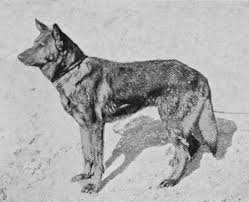The Ultimate Guide to German Shepherds: Part 1 - Introduction to the German Shepherd Breed
- Feb 25, 2025
- 4 min read
Updated: Feb 28, 2025
Introduction to the German Shepherd Breed
German Shepherds are one of the most popular and versatile dog breeds in the world. Known for their intelligence, loyalty, and protective nature, they excel in various roles, from family pets to working dogs in police and military forces. In this 10 piece guide, we will explore the history, characteristics, and reasons why this breed is cherished by so many.

1. The History of the German Shepherd
The German Shepherd breed was developed in the late 19th century by Captain Max von Stephanitz, who sought to create the ideal working dog. He focused on intelligence, strength, and obedience, leading to the breed we know today. Initially bred for herding, German Shepherds quickly gained recognition for their versatility and were soon employed in police work, military service, and search-and-rescue missions worldwide.
During World War I and World War II, anti-German sentiment led to the breed being renamed "Alsatian" in the UK, as people were reluctant to use the word "German." The name came from the Alsace region of France, where many German Shepherds were stationed during the war. Despite the name change, the breed remained the same. In 1977, the UK Kennel Club restored the original name, German Shepherd Dog, though some still refer to them as Alsatians today.
2. Physical Characteristics
German Shepherds are large, muscular dogs with a well-proportioned body. Their distinctive features include:
Size: Males typically weigh between 30-40 kg (66-88 lbs), while females weigh 22-32 kg (49-71 lbs).
Height: Males stand 60-65 cm (24-26 inches) tall, while females measure 55-60 cm (22-24 inches).
Coat: They have a double coat that can be short or long, with colours including black and tan, sable, or all-black.
Ears & Tail: German Shepherds have erect ears and a bushy tail, adding to their alert and intelligent expression.
3. Temperament and Personality
One of the most defining traits of the German Shepherd is its temperament. These dogs are:
Highly Intelligent: They are ranked as the third most intelligent dog breed and can learn commands quickly.
Loyal and Protective: They form strong bonds with their owners and can be protective of their family.
Energetic and Playful: They require plenty of physical and mental stimulation to stay happy and well-behaved.
Adaptable: Whether in a family home, on a farm, or in a working role, German Shepherds thrive in different environments.
4. The German Shepherd as a Working Dog
Due to their intelligence and trainability, German Shepherds excel in various roles, such as:
Police and Military Dogs: Used for tracking, protection, and detection work.
Service and Therapy Dogs: Assist individuals with disabilities or provide emotional support.
Search and Rescue Dogs: Help locate missing persons in disaster situations.
5. Is a German Shepherd Right for You?
Owning a German Shepherd is a rewarding experience, but it also comes with challenges. These dogs are intelligent, energetic, and protective, requiring dedicated training and care. While they can be wonderful companions and working dogs, they are not the right fit for everyone. Understanding both the benefits and potential difficulties of owning a German Shepherd will help you determine if this breed suits your lifestyle.
Pros and Cons of Owning a German Shepherd
Positives:
Highly Intelligent – They are quick learners, making them easy to train for various tasks.
Loyal and Protective – They form strong bonds with their families and are naturally protective.
Versatile – They excel as working dogs, family pets, and service animals.
Energetic and Playful – They enjoy outdoor activities and can be great companions for active owners.
Excellent Guard Dogs – Their natural alertness and protective instincts make them effective watchdogs.
Good with Training – With consistent training, they can be well-mannered and obedient.
Negatives:
High Maintenance – They require regular grooming, especially those with long coats.
Exercise Demands – They need a lot of daily physical and mental stimulation to prevent boredom.
Can Be Overprotective – Without proper training and socialisation, they may become overly territorial.
Prone to Health Issues – Conditions like hip dysplasia and digestive problems are common.
Not Ideal for Small Spaces – They need plenty of room to move and may not thrive in small apartments, unless you give them plenty of time outside to be social and exercise their brain and body, and then they can be couch potatoes.
Strong-Willed – Their intelligence means they need firm and consistent leadership to prevent stubborn behaviour.
Before getting a German Shepherd, consider the following:
Time Commitment: They require daily exercise, training, and socialisation.
Space Requirements: Ideally suited to homes with a garden or access to large outdoor areas if you are not going to be doing a lot with them.
Training Needs: Early and consistent training is essential to manage their protective instincts and stop them training themselves.
Many German Shepherds are sadly abandoned because their owners have not dedicated enough time and effort to their training and socialisation. Without proper guidance, they can become reactive with other dogs or develop destructive behaviours. It is crucial to understand their needs before committing to ownership.
Conclusion
The German Shepherd is a remarkable breed with a rich history and diverse abilities. Whether as a loyal family companion or a dedicated working dog, they bring intelligence, energy, and devotion to their owners. In the next part of this series, we’ll delve deeper into their temperament and personality traits to help you understand their behaviour better.
Stay tuned for Part 2: German Shepherd Temperament and Personality!








Comments